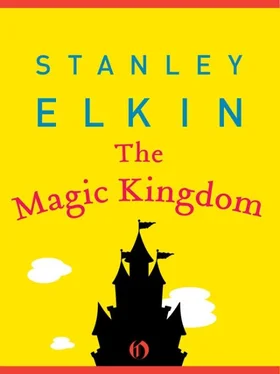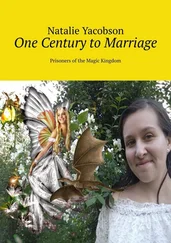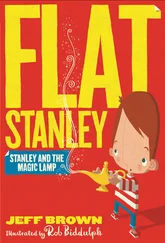An airlines agent cleared his throat into a live microphone. “Well,” Ginny said, holding her hand out for her husband to shake, “happy landings.”
“Turn and turn about,” Eddy Bale said, taking it.
“Good trip, Colin,” she said, acknowledging her dead son’s nurse. Bible nodded, and Ginny went off with her lover.
Parents were hugging their own, each other’s kids. Colin Bible’s roommate, who’d shown up just as the children and their caretakers were about to board, reached out and patted his friend’s cheek and handed him what looked to be a brand-new Polaroid camera. Mary Cottle smiled dreamily as Lydia Conscience began to recite. “Now I lay me down to sleep,” she recited, “and pray the Lord my soul to keep. And if I die before I wake, I pray the Lord my soul to take.”
“It’s just like they say,” Benny Maxine said. “There ain’t no atheists in foxholes.” And Eddy Bale, boarding the airplane, wondered what he thought he was doing and, oddly, and not for the first time either, just what the hell went on behind that yellow curtain.
Mr. Moorhead needn’t have worried. He’d been unable to sleep during the long flight across the Atlantic. Though he hadn’t paid for a headset, he sat in the dark and watched a film he’d already seen, trying, with the aid of his memory and intense concentration, to read the actors’ lips, even to bring back the theme music, grand and vaguely classical, to see if he could match his memory of the story to the mood of the weak and watery silent scene projected before him on a screen the size of a desk top. For some reason the exercise reminded him of his days as a medical student, when he’d spent entire nights getting up an exam. A close-up of the heroine brought back the obscure pathology of a wasting disease, a master shot of a city street the sharp, deserted, shut-down memory of epidemic, an overview of a crowd scene the metallic taste and texture of plague. He rarely took his eyes from the screen — once to adjust the volume on Tony Word’s headset and again to find an additional blanket for Lydia Conscience — and when the film was over Mr. Moorhead had both a complicated sense of the film’s mildly melodramatic plot and the sour etiologies of a hundred diseases in his head.
What had upset him, however obscurely, what had forced him to his strange effort to bring back an entire motion picture he hadn’t enjoyed when he’d seen it the first time, was the fear that he might have to room with Colin Bible.
I’m not a bad man, Mr. Moorhead thought. I do no evil. And, wondering whether he was a good doctor, he began soundlessly to cry.
In the seat next to him Benny Maxine stirred, whimpered in his sleep. The doctor carefully removed the shoes from the boy’s swollen feet and loosened the small airline blanket from where it had become tangled, caught beneath his hips. He adjusted the pillow to a more comfortable angle and frowned in the dim light at the Jew’s oddly slacked jaw, the puffy, almost flexible bone structure that gave Benny’s head a queer mashed quality. If he could he would have remolded the kid’s face, tamping, patting, massaging the bad bones back into phase, packing the distended skin about them as he would have trimmed wet sand about the pylons and fretwork of a beach castle.
Mr. Moorhead had a vagrant impulse toward the chiropractic, an urge like some Pygmalion of the medical, a desire to extract health, to grow it like a culture in a petri dish, to adjust, as he’d adjusted Benny’s blanket and pillow, drawing off all the gnarled strings and matted clumps of illness and disease. At university he had led his classes in anatomy, a wizard of parts, an almost sculptor’s instinct for muscle and bone, an almost geologist’s or diviner’s one for the shales and fluids of form. He could tell at a glance the distortions on an anatomical chart and all the split ends of an internal organ badly drawn. He had an artist’s eye for the human body and, in museums, would actually diagnose statues, excitedly explaining to astonished friends, even to strangers, which statues and pictures were modeled from life, which were only the sculptor’s or painter’s Platonic ideal. Michelangelo he thought a fraud. “If there’d been an actual model for David,” he’d once told his professor, “he’d probably still be alive.” And had a theory that her incipient goiter would, were she real, almost certainly have killed off the Mona Lisa before her thirtieth year.
And that was the rub. A pal to whom he’d explained his David idea was a student at the Royal Academy of Art. “But look here, Moorhead,” his friend told him, “there really was. A model. Some kosher boy Michelangelo was sweet on. Genuine McCoy right down to his high holy circumcised pecker. There are life casts in the R.A. basement.”
“Life casts.”
His friend winked. “High times in sunny Italy. Signor Buonarroti liked them dripping in plaster, ooh la la.”
Because he was smitten by an ideal of health and life, some full-moon notion of the hale and hearty. Of soundness, bloom, the body filled to its sunny, f-stop conditions of solstitial, absolute ripeness like a ship floating in water precisely between its measured load lines. Flowers in their brief perfection broke his heart. Healthy beasts did. All perfect specimens, male and female. All heedless vitality, all organisms generally unconscious of pain, unmindful of death. It was why he had become a doctor in the first place and chosen pediatrics as his specialty. It was what both appalled and fascinated him about Jews.
He was already a resident when he saw the photographs. Of the survivors. From the camps. Not men but devastated, stick- figured blueprints for men. The declined, obscene inversions of all those anatomical paradigms of the human he’d studied at university. And that overturned for him forever the near-flawless portraits of the sound and scatheless, the immaculately unblemished, all those slick, transparent graphics and overlays that had, almost without his thinking about it, instilled in him an idea of centrifugal man, the notion of health as a radiation outward from some fixed center, of the organs and glands, the gristles and guts, impacting their neighbors, transmitting actual electric life from some unseen, unseeable omphalos — pith? gist? soul? — as if body, body itself, were only a kind of archaeology, some careful pile of palimpsest arrangement, sequential as arithmetic. The photographs had been a revelation to him, astonishing not for what they revealed to him about what men were capable of doing to each other but for what they taught him about his trade. He had to revise all his old theories. Disease, not health, was at the core of things; his idea of pith and gist and soul obsolete for him now, revised downward to flaw, nubbin, rift; incipient sickness the seed which sent forth its contaged shoots raging through the poisoned circuits of being. He stuck a jeweler’s loupe in his eye and examined, pored over, scrutinized, their busted constitutions. From loose and sunken skeletons, from hollows and craters beneath baggy skin ill-fitting as badly hung wallpaper, he dared spectacular diagnoses, astonishing prognoses. He must have seemed like some scholarly counterfeiter, double-, even triple-checking his plates, searching them for error and balls-up. Learning more from those terrible photographs than ever he had from the perfect meat in those idealized medical texts. He must have seemed crazy to his Jewish registrar, who caught him out, the loupe in his eye like a pawnbroker’s and the pictures spread out before him like pornography.
But Colin Bible was a different story.
Colin Bible was a perfect specimen and Mr. Moorhead was flustered by him. He hadn’t bargained for any Colin Bible. Most likely the male nurse was a fag and, already in love with the man’s visible health, Moorhead bit his nails and worried that he’d have to share a room with him. He wished now he’d argued more persuasively with his wife, a comfortable, not unattractive woman, made safe to Moorhead’s consciousness by the varicose veins in her calves, that she accompany him. Moorhead, who wished to be a good man, missed her. He was crying again, not soundlessly this time but openly sobbing.
Читать дальше












